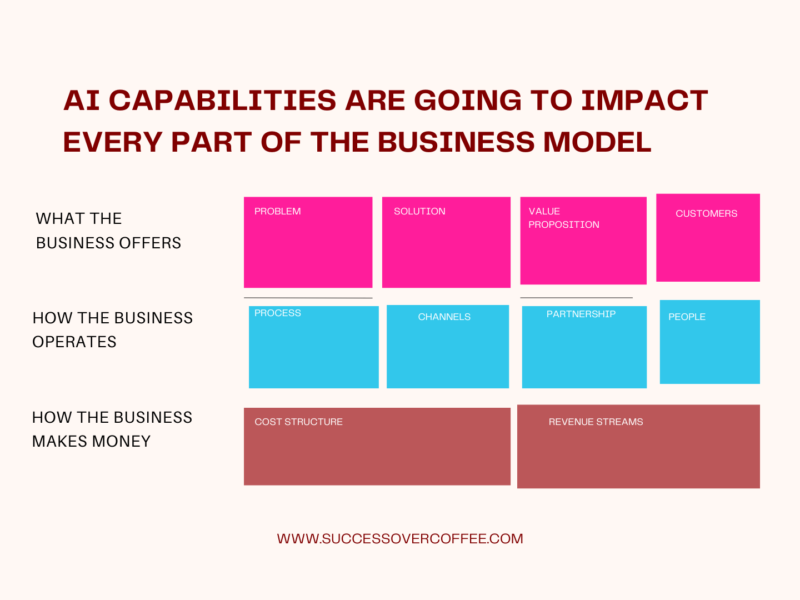
Artificial Intelligence (AI) is no longer just a buzzword; it is fundamentally transforming the way businesses operate. From product development to customer experience, AI-driven innovation is reshaping entire industries. For entrepreneurs and business leaders, understanding AI’s impact on each component of the business model is crucial to staying competitive. Let’s explore how AI is set to revolutionize every aspect of the business model.
1. Value Proposition: Creating Smarter, More Personalized Offerings
AI enables businesses to develop innovative products and services that are more aligned with customer needs. Machine learning algorithms analyze vast amounts of data to predict consumer preferences, leading to hyper-personalization. Companies like Netflix and Spotify use AI to tailor content recommendations, enhancing user satisfaction and engagement.
2. Customer Segments: Precision Targeting with AI Analytics
AI-driven analytics tools allow businesses to segment their audience more accurately than ever before. Instead of relying on broad demographics, AI can analyze behavioral patterns, purchase history, and real-time interactions to define micro-segments. This precision targeting enables businesses to craft marketing messages and offers that resonate deeply with specific customer groups.
3. Channels: Optimizing Customer Engagement
AI is transforming how businesses reach and interact with customers. Chatbots and virtual assistants powered by AI enhance customer service, providing 24/7 support and instant query resolution. AI-driven recommendation engines ensure that the right products are promoted through the right channels, increasing conversion rates and reducing marketing waste.
4. Customer Relationships: Enhancing Engagement Through Automation
With AI, businesses can foster stronger customer relationships by automating interactions while maintaining a human touch. AI-powered CRM systems analyze customer interactions to predict needs and optimize engagement strategies. Predictive analytics can also proactively address potential issues, reducing customer churn and increasing loyalty.
5. Revenue Streams: Unlocking New Monetization Opportunities
AI is creating new revenue streams by enabling subscription-based and data-driven business models. Companies can leverage AI to offer premium personalized services, AI-assisted consultations, or even monetize proprietary AI tools. Additionally, dynamic pricing strategies powered by AI help businesses optimize pricing based on demand fluctuations and consumer behavior.
6. Key Resources: AI as a Business Asset
Data is the new oil, and AI is the refinery. Businesses that harness AI-driven insights can optimize their supply chains, workforce productivity, and financial planning. AI-powered predictive maintenance, for example, allows manufacturers to prevent equipment failures before they happen, reducing downtime and costs.
7. Key Activities: Automating and Enhancing Operations
AI is revolutionizing business operations by automating repetitive tasks and augmenting decision-making. In industries like finance, AI-driven fraud detection systems help mitigate risks. In marketing, AI can optimize campaign performance in real-time. Automation in HR streamlines recruitment by analyzing resumes and matching candidates with job descriptions.
8. Key Partnerships: Collaborating with AI Providers
As AI evolves, strategic partnerships with AI vendors and tech firms become essential. Companies that lack in-house AI expertise can collaborate with AI startups or integrate AI-powered APIs into their workflows. Businesses can also leverage cloud-based AI solutions to scale AI adoption without heavy infrastructure investments.
9. Cost Structure: Optimizing Efficiency and Reducing Expenses
AI helps businesses reduce operational costs by improving efficiency and automating labor-intensive processes. AI-driven predictive analytics reduce waste in supply chains, optimize energy consumption, and streamline resource allocation. Although AI implementation requires an initial investment, the long-term cost savings and efficiency gains outweigh the costs.
Preparing for an AI-Driven Future
AI is no longer an option but a necessity for businesses that want to stay ahead of the competition. By understanding AI’s role in every part of the business model, companies can strategically integrate AI to drive growth, efficiency, and innovation. The businesses that succeed in the AI era will be those that embrace change, leverage AI-driven insights, and continuously evolve with the technology.
Are you ready to integrate AI into your business model? The future belongs to those who do! Contact us for a AI Business Strategy Evaluation! Whatsapp: 0126669892!

Comments